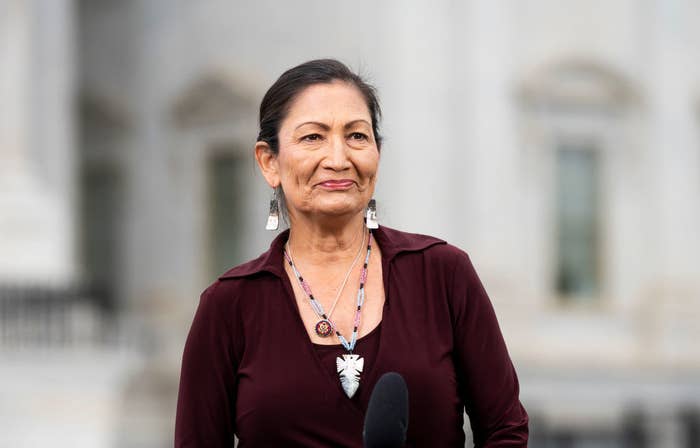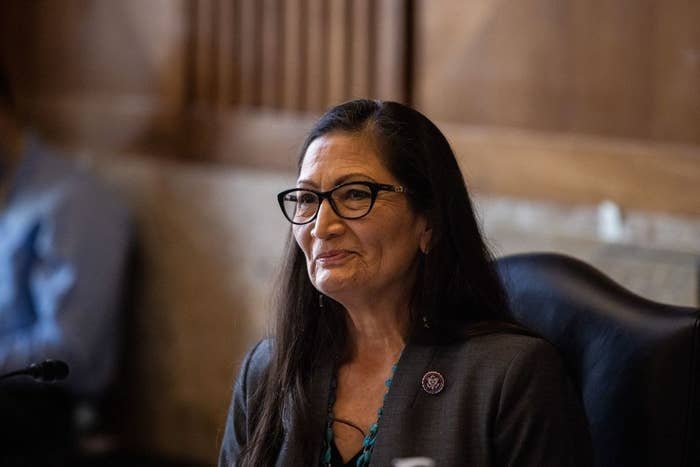
The Senate on Monday evening voted 51–40 to confirm Deb Haaland as secretary of the Department of the Interior, making her the first Native American to run the agency and serve in the US Cabinet. Haaland will lead the agency of around 60,000 staffers tasked with overseeing millions of acres of federal lands.
Haaland’s confirmation comes after months of tense debate between conservatives — alarmed by Haaland’s protests against the Dakota Access Pipeline and her support for the Green New Deal — and environmental and Indigenous activists, who cheered the appointment of an Interior head committed to protecting the environment.
“This is all of our country. This is our mother — you’ve heard the Earth referred to as Mother Earth,” Haaland told Congress during her confirmation hearing. “It’s difficult to not feel obligated to protect this land and I feel that every Indigenous person in this country understands that.”
Haaland became the representative of the 1st District of New Mexico in 2019, making her one of the first women Native Americans elected into Congress. That year, she received the most bipartisan support for her bills compared to other first-year Congress members, according to GovTrack’s 2019 report card.
Despite this record of working across the aisle, only 4 Republicans in the Senate voted for her confirmation, along with 47 Democrats.
During Haaland’s confirmation hearing, Republican senators such as Steve Daines of Montana repeatedly referred to her as a “radical” for her support of policies that tackle the climate crisis and expand conservation, including her proposal to protect 30% of US lands and ocean waters from development by 2030, a target the Biden administration has since adopted. Daines then tried to stall her confirmation vote.
These same environmental advocacy efforts won her praise from progressive groups, including the Sunrise Movement.
Sen. Maria Cantwell, a Democrat from Washington state, summed up the controversy surrounding Haaland’s confirmation hearing, saying: “I almost feel like your nomination is a proxy fight over the future of fossil fuels.”
Haaland has long been a vocal critic of the oil and gas industry, telling the Guardian in an interview in 2019, “I am wholeheartedly against fracking and drilling on public lands.”
In 2016, Haaland also spent four days at the Standing Rock Sioux camps supporting the protests to block the controversial Dakota Access oil pipeline. Speaking about that experience to the High Plains Reader, Haaland said, “I felt like we really had hit on an environmental movement that was deep and meaningful.”

As Biden’s interior secretary, Haaland will lead an agency in charge of hundreds of national parks, monuments, and wildlife refuges, as well as energy and mineral development on public lands and in national waters. The Biden administration has already put the agency at the center of his climate agenda, pausing new federal leases for oil and gas development as the DOI reviews ways to cut its carbon footprint.
These early moves stand in stark contrast to the Trump administration’s DOI, which aggressively approved new leases for coal, natural gas, and oil development across public lands and waters, even shrinking federal monuments and unraveling wildlife refuge protections to do so.
Over the past four years, “you really saw the federal fossil fuel program really go off the rails,” said Julia Bernal of the New Mexico community organization Pueblo Action Alliance. “Nothing about the Trump administration had to do with land or cultural resource conservation or water conservation.”
The DOI plays a significant role in handling US relations with Indigenous groups, overseeing the Bureau of Indian Affairs that provides services to 574 federally recognized tribes. So advocates for Indigenous people across the country celebrated Haaland’s new role.
“The Department of the Interior sets the tone of the government's relationships with Native American tribal nations,” Ronnie Jo Horse, executive director of the community organization Western Native Voice and a member of Oglala Lakota Nation, told BuzzFeed News.
“In the past, decisions were made by not knowing anything about tribal nations and what we face daily,” she said, adding that Haaland’s “glass breaking” confirmation changes that. “She comes from the same place we do so, so she’s familiar with the issues we face.”
Bernal, a tribal member of Sandia Pueblo, said she was hopeful Haaland would make climate change a central part of her leadership efforts.
“Having Deb Haaland, an Indigenous woman, brings a new feminist perspective in how we need to manage land, natural resources, and water because we’re having to come up with new mitigation strategies to absorb the shock of climate change,” Bernal said, later adding: “Deb is like our auntie. She’s our relative. We really wish her well.”
UPDATE
This story has been updated to include the number of Republicans and Democrats who voted for Haaland's confirmation.
